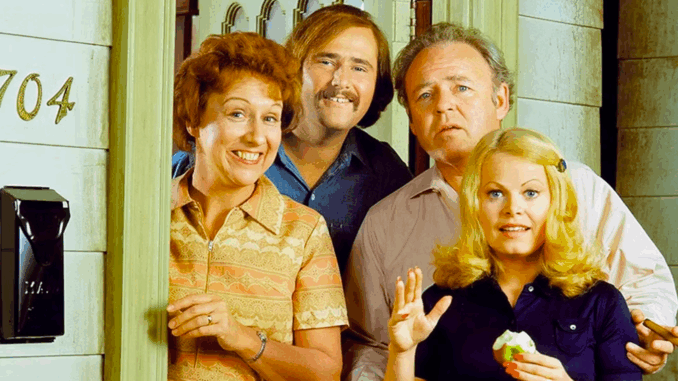
A Living Room Like No Other
When All in the Family premiered on January 12, 1971, audiences didn’t know what hit them. At first glance, it was a simple sitcom about a working-class family in Queens. But within minutes, it was clear this was something different — a bold, brutally honest look at American society, told from the comfort of Archie Bunker’s favorite chair.
Meet the Bunkers
The show revolved around Archie Bunker (Carroll O’Connor), a gruff, opinionated man who clung to his worldview no matter how outdated it was. His wife Edith (Jean Stapleton) was sweet and loyal, often dismissed as “dingbat” but possessing a quiet wisdom. Their daughter Gloria (Sally Struthers) and her husband Mike “Meathead” Stivic (Rob Reiner) represented the young, progressive voices of a changing America.
Not Just Jokes — Real Issues, Real Emotions
What made All in the Family groundbreaking wasn’t just its humor — it was what it dared to talk about. Racism, sexism, politics, religion, war, and class — topics most shows avoided — were front and center, argued across the Bunkers’ dinner table in every episode.
Archie: A Mirror, Not a Monster
While Archie often said things that were offensive, the show never endorsed his views. Instead, it held up a mirror to American society, asking viewers to reflect. And somehow, despite his flaws, Archie remained human. You might not agree with him — but you knew someone like him.
Why the Show Still Matters
The Format Was Familiar — But the Content Was Revolutionary
The show used the traditional structure of a sitcom — one set, a small cast, canned laughter — but filled it with content that made people uncomfortable, laugh, think, and talk.
Norman Lear, the show’s creator, said, “We used the sitcom format as a Trojan horse. You come for the laughs, but you leave thinking.”
A Legacy That Lives On
All in the Family ran for nine seasons, won multiple Emmys, and spawned several spinoffs, including The Jeffersons, Maude, and Archie Bunker’s Place. But more than awards or ratings, its biggest legacy is this: it proved TV could challenge the world instead of just entertaining it.
A Simple Ending for a Complex Show
The final episode, “Too Good Edith”, aired in 1979. It wasn’t a flashy goodbye. Instead, it gave us a quiet moment between Archie and Edith — a reminder that beneath all the arguments, love was the thread holding them together.
